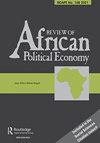苏丹的最低限度霸权:探讨伊斯兰民族阵线的兴衰
IF 1.4
3区 社会学
Q1 AREA STUDIES
引用次数: 3
摘要
本文采用葛兰西的方法来探讨苏丹伊斯兰民族阵线(NIF)兴衰背后的政治经济学。它追溯了NIF自20世纪60年代以来的崛起,特别关注其霸权计划的阶级特征和意识形态的转变。通过最小霸权的视角解读其统治,它批判性地探讨了新自由主义重组如何以牺牲和边缘化不同的社会群体为代价产生了一个狭窄但强大的统治集团,以及国际关系的变化如何与苏丹的社会转型交织在一起,以再现新的依赖形式。关注资本主义发展的不平衡性以及在此期间产生的对抗,它探讨了为什么NIF无法建立一个完整的霸权,最终以推翻巴希尔的权威危机和社会力量的出现而结束,这些力量继续挑战其文化,政治和经济项目。本文章由计算机程序翻译,如有差异,请以英文原文为准。
Minimal hegemony in Sudan: exploring the rise and fall of the National Islamic Front
ABSTRACT This article adopts a Gramscian approach to exploring the political economy behind the rise and fall of the National Islamic Front (NIF) in Sudan. It traces the NIF’s rise from the 1960s, with particular attention to the class character of its hegemonic project and shifting ideology. Reading its reign through the lens of minimal hegemony, it critically explores how neoliberal restructuring produced a narrow but powerful ruling bloc at the expense and marginalisation of different social groups, and how shifts in international relations intertwined with social transformations across Sudan to reproduce new forms of dependency. Paying attention to the uneven nature of capitalist development and resulting antagonisms during this period, it explores why the NIF was unable to forge an integral hegemony, ending with the crisis of authority that overthrew Bashir and the emergence of social forces that continue to contest its cultural, political and economic project.
求助全文
通过发布文献求助,成功后即可免费获取论文全文。
去求助
来源期刊

Review of African Political Economy
Multiple-
CiteScore
3.00
自引率
7.70%
发文量
29
期刊介绍:
The Review of African Political Economy (ROAPE) is a refereed journal committed to encouraging high quality research and fostering excellence in the understanding of African political economy. Published quarterly by Routledge, Taylor & Francis Group for the ROAPE international collective it has since 1974 provided radical analysis of trends and issues in Africa. It has paid particular attention to the political economy of inequality, exploitation and oppression, whether driven by global forces or local ones (such as class, race, community and gender), and to materialist interpretations of change in Africa. It has sustained a critical analysis of the nature of power and the state in Africa.
 求助内容:
求助内容: 应助结果提醒方式:
应助结果提醒方式:


